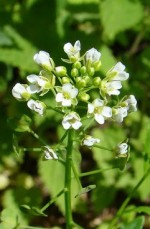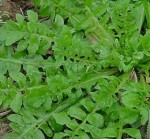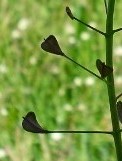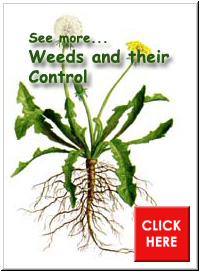 A native of Europe and Asia Minor, shepard’s purse is a winter or summer annual that has spread throughout the United States including Alaska and Hawai. It is a member of the mustard family and related to broccoli, cauliflower, turnips, and cabbage. Shepherd’s purse prefers full sun, medium to dry conditions, and tolerates many different soils. It is common in highly disturbed sites where the soil has been exposed and may be found in gardens, lawns, abandon fields, hedge rows, and various waste areas such as vacant lots, construction sites and along road sides and train tracks. Shepherd’s purse serves as an alternate host for beet leafhoppers that carry curlytop virus to beats, beans, and tomatoes.
A native of Europe and Asia Minor, shepard’s purse is a winter or summer annual that has spread throughout the United States including Alaska and Hawai. It is a member of the mustard family and related to broccoli, cauliflower, turnips, and cabbage. Shepherd’s purse prefers full sun, medium to dry conditions, and tolerates many different soils. It is common in highly disturbed sites where the soil has been exposed and may be found in gardens, lawns, abandon fields, hedge rows, and various waste areas such as vacant lots, construction sites and along road sides and train tracks. Shepherd’s purse serves as an alternate host for beet leafhoppers that carry curlytop virus to beats, beans, and tomatoes.
 Description: Seedlings appear in fall or as soon as the ground thaws in spring and quickly grow into a rosette nine inches across and consisting of lobed leaves four to five inches long and about 1” wide.
Description: Seedlings appear in fall or as soon as the ground thaws in spring and quickly grow into a rosette nine inches across and consisting of lobed leaves four to five inches long and about 1” wide.  The new leaves that develop as spring progresses are less lobed and are arrow-shaped. Erect, sparingly branched, reddish-purple or green flowering stems arise from the rosette bearing a few widely spaced, alternate leaves that are linear and diminish in size as the ascend. The stems grow four to twenty inches tall and terminate in a raceme of small, white,
The new leaves that develop as spring progresses are less lobed and are arrow-shaped. Erect, sparingly branched, reddish-purple or green flowering stems arise from the rosette bearing a few widely spaced, alternate leaves that are linear and diminish in size as the ascend. The stems grow four to twenty inches tall and terminate in a raceme of small, white,  4-petaled flowers appearing either from spring to mid-summer, or mid-summer to fall, depending on when the seedlings appeared in fall or spring. The flowers develop unique seed capsules are roughly heart-shaped and are said to resemble the shephard’s purses from medieval times, hence the common name. Each capsule contains about 20 yellow-to reddish brown, small, shiny seeds that remain in the soil for several years. A single plant can produce over 30,000 seeds. The root system is a slender fibrous tap root.
4-petaled flowers appearing either from spring to mid-summer, or mid-summer to fall, depending on when the seedlings appeared in fall or spring. The flowers develop unique seed capsules are roughly heart-shaped and are said to resemble the shephard’s purses from medieval times, hence the common name. Each capsule contains about 20 yellow-to reddish brown, small, shiny seeds that remain in the soil for several years. A single plant can produce over 30,000 seeds. The root system is a slender fibrous tap root.

 Control: Control measures are aimed at reducing the seed production since the plant is an annual and dies at the end of a season. Mulching is very effective in reducing the growth of seedlings and hand pulling or hoeing young plants is easily accomplished. Likewise, dense planting of desirable plants reduces shepherd’s purse growth especially if the plants are taller and shade the shepherd’s purse. Preemergent herbicides containing trifluralin applied in early spring before seedlings appear reduces seed germination but is not as effective a control measure as postemergent herbicides containing 2,4-D, MCPP or dicamba.
Control: Control measures are aimed at reducing the seed production since the plant is an annual and dies at the end of a season. Mulching is very effective in reducing the growth of seedlings and hand pulling or hoeing young plants is easily accomplished. Likewise, dense planting of desirable plants reduces shepherd’s purse growth especially if the plants are taller and shade the shepherd’s purse. Preemergent herbicides containing trifluralin applied in early spring before seedlings appear reduces seed germination but is not as effective a control measure as postemergent herbicides containing 2,4-D, MCPP or dicamba.